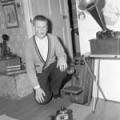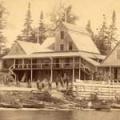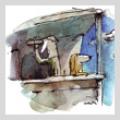Welcome Downeast
The Town, the Bays, the Mountains
“I must go down to the sea again,
to the lonely sea and the sky;
And all I ask is a tall ship and a star to
steer her by…
And all I ask is a windy day with the white
clouds flying
And the flung spray and the blown spume
and the seagulls crying…”
—From John Masefield, 1878-1967
Dear Friends:
At this season of the year, the cold waters of the North Atlantic and the Gulf of Maine are lonely, as the poet John Masefield notes in his much-declaimed poem “Sea Fever.” By now the tall ships have mostly upped anchor for warmer climes. Fishing boats are fewer now that lobster season is over. Pleasure boats have been hauled out or are headed south too. Scallop draggers still plow up the bottom of the bay, but fewer each day.
Marine mammals like the harbor seals and right whales have gone south. So have the migrating shore birds, the ospreys, and some of the eagles. Still staying right here to winter over with us and sending their raucous calls through the quiet sky are the perpetual seagulls. If gulls weren’t so abundant, people would come from afar to observe them. Taken one or two at a time, they are a striking bird: stately, handsome, social, and remarkably adapted to their environment. But there are just too darned many of them. Then again, the same could be said for us.
Natural events, January
One good thing about a bitter cold snap early in the winter is this: From now on, unless it gets down to 20 below and stays there for two weeks, anything the season can throw at us will look mild compared to what we have already been through. We’re hardened-off good and proper. Bitter cold is particularly hard for those who work outside or keep animals. Machinery gets cranky and may break or refuse to run, but the animals must be fed and watered regardless of the weather. Chores that take an hour when it’s milder may take two or three when it is so cold. But we learn from it and next time it happens, maybe we’ll be better able to handle it.
Snow or no snow, across New England and beyond, pruning season has begun in apple orchards. From figs and olives in the ancient East to apples and pears in the modern West, gathering food from trees is one of the oldest kinds of agriculture, and the Tree of Life is one of the most abiding mythical motifs of humankind, appearing in nearly all cultures. So, being entrusted with the care of one apple tree, or one hundred, is a gateway to a world of wonder.
It is a wonder and a privilege to be caring for these large living things. It takes patience and care and a long view to prune a tree well. Everything the pruner does affects the future life and health of the tree. Ignorance or carelessness or haste can do harm, and yet it will be several months, or even years, before we can know how well we have done for the tree. And so it is with the whole Tree of Life.
 Illustration by Candice Hutchison
Illustration by Candice Hutchison
Field and forest report
Mid-January is the time here in Maine when most non-essential functions grind to a halt and only essential functions carry on. Trees, for example, continue to grow, drawing on stored reserves, although they grow much more slowly. Perennial plants stop growing entirely, and annuals die and return to the earth. Over-wintering birds and other animals conserve energy by keeping to the basics: food and shelter. This is not the time for choruses of bird song, showy courtship displays, or exuberant play. Life has gone from a fast jig to a slow waltz.
Throughout the cold months, trees add a narrow dark growth ring to their trunks. White-tail does carry their unborn through the winter as they gather in their deer yards in the cedar swamps. Black bear sows give birth in their dens in January while they are hibernating. Their tiny cubs are born blind and cuddle in to stay warm and grow on their mother’s milk deep in their dark dens until spring.
Restful events
Hibernation is one of many marvelous adaptations to life in cold climates. A bear’s body temperature may drop 8º to 12º Farhrenheit and her heartbeat slow to 8 beats a minute during her Great Sleep. But more, a chipmunk’s body temperature may drop from 94º to about 40º and its heart rate may drop from 350 beats a minute to four. Bears and chipmunks do wake occasionally in the winter so strict biologists declare them “not true hibernators” saving that distinction for woodchucks, brown bats and jumping meadow mice which do not wake at all throughout the cold months. Did you know this?
Wild speculation
Do hibernators dream? Does the bear dream of mountain meadows with blueberries a’plenty and forest floors covered with beech nuts? Does the chipmunk dream of a huge cache of sunflower seeds? Does the woodchuck dream of the juicy lettuce in your garden next year and the brown bat dream of a smorgasbord of juicy moths? Do we dream of a world that could be?
Rank opinion
Winter is a fine time to dream, to imagine a better vision for ourselves, our families, our towns, our beloved and beleaguered country. Dream without restrictions, without judgment, without fear. Then, hold those dreams under your warm quilts and comforters until they are ready to come out and change the world in some way, no matter how small. Share them with others and fit your dreams to theirs and theirs to yours for even more power for good.
Natural events, February
February 2nd marks the traditional midwinter day roughly halfway between the first day of winter and the first day of spring. The history of this celebration is a study in stubbornness. In ancient pagan religions the day marked the turning toward Spring. The Gaelic word for midwinter day, “Imbolc,” means “in the belly,” referring to pregnant ewes soon to give birth, or “in milk” because they begin lactating around this time. The Roman Church tended to erase pagan festivals heavy-handedly by erecting others upon them, just as they built churches on pagan ruins. They renamed Imbolc “Candlemas Day” or the “Feast of the Purification of Mary.” The Celtic church preferred to preserve pagan traditions while dressing them up in Christian clothes, converting by magic more than by might, in this case celebrating St. Brigid’s Day around Imbolc. St. Brigid was simply the pagan goddess cleverly disguised wearing a nun’s habit.
This apparently fooled Rome, as the festival is still celebrated as Brigid’s to this day in Ireland. The stubborn American incarnation of this ancient pagan festival is Groundhog Day when hundreds will gather to watch the moves of the marvelous marmot of Punxatawney, Pennsylvania.
Here in Maine we have other concerns at midwinter. One is the wood pile. The old wisdom says we should still have half our wood. Of course, all that wood heat has dried out the house so it’s like an indoor desert. We get little shocks from the refrigerator, our hair stands on end when we take off our ski caps, and our skin flakes off like snow. Plenty of hot water on the stove and cool water down the gullet can help. Those of us who are of the Caucasian persuasion begin to look like the underbelly of a trout and are in danger of disappearing against the snow altogether unless we wear colorful clothing.
Then of course there is the insidious winter malady of cabin fever. Ideas to heal the spirit: learn to play the harmonica, go to church (but maybe not at the same time), go to bean suppers, dance, impulsively rearrange the furniture at home, volunteer at the food pantry or school, but most of all, shower all the people you love with love. Or just shower with the one person you love. Sugar time is right around the corner.
Rank opinion
If we have more than half our wood, we can deliver some to warm the cold. If we have extra food or cash, we can donate to the food pantry or the local fuel fund. This will help some weary body. And, if we have more than half of our hope and half our faith left, these can really do good for some weary soul. They say wood warms us twice; once when we cut it and once when we burn it. But a friendly visit warms us three times; once when we think of it, once when we do it, and once again when we remember it. Even the poorest person can deliver a load of help, hope, or humor to some soul who desperately needs it to get through the Winter. In February, a good laugh is worth almost as much as a good meal, but how about a good laugh AND a good meal? Now, that is 10 times better. Get out there and visit. It could make the difference between life and death for a weary soul—maybe even you—in the bleak Midwinter.
 Illustration by Candice Hutchison
Illustration by Candice Hutchison
Field and forest report
Fields are now covered in deep snow with sculpted drifts following the sweeping flow of wind currents around trees, ledges and old stone walls. Deer leap in great arcs through the drifts with white tails high, throwing plumes of snow silently behind them. Snowshoe hare forage far afield leaving their exclamatory trails from cover to cover looking for juicy bark to gnaw. On warmer nights the pungent perfumes of prowling skunks waft on the breezes as they seek out mates for the coming season. Porcupines may rise to greet the dawn with reverence.
The woodpeckers have begun their courting just in time for Valentine’s Day, adding percussion to the day. Once I thought I heard drops of rain around me the other day, but I could feel none. It turned out to be three hairy woodpeckers drumming away from three different places in the surrounding trees. Next day it was the pileated woodpeckers shouting and dipping and drumming in the big woods. The pileated provides the low notes, the hairy the middle, and the downy provides the high notes in this midwinter percussion concert.
During the day, cedar waxwings are flocking to feed on last year’s old apples, rose hips, and viburnum berries. At night the birds retire into the treetops and the thick pucker brush to hunker down, slumber lightly and knit up the raveled sleeve of winter care. Sleep, sleep soundly, one and all.
Seedpod to carry around with you
From Susan B. Anthony: “The older I get, the greater power I seem to have to help the world. I am like a snowball—the further I am rolled, the more I gain.”
That’s the Almanack for this time. But don’t take it from us—we’re no experts. Go out and see for yourself.
Yr. mst. humble & obd’nt servant,
Rob McCall.
Rob McCall (1944-2023) lived in Brooklin, Maine. Selections in this almanack were excerpted from his archives.
Related Articles
Share this article:
2023 Maine Boat & Home Show

Join Us for the Maine Boat & Home Show!
Art, Artisans, Food, Fun & Boats, Boats, Boats
August 11 - 13, 2023 | On the waterfront, Rockland, Maine
Click here to pre-order your tickets.
Show is produced by Maine Boats, Homes & Harbors magazine.















